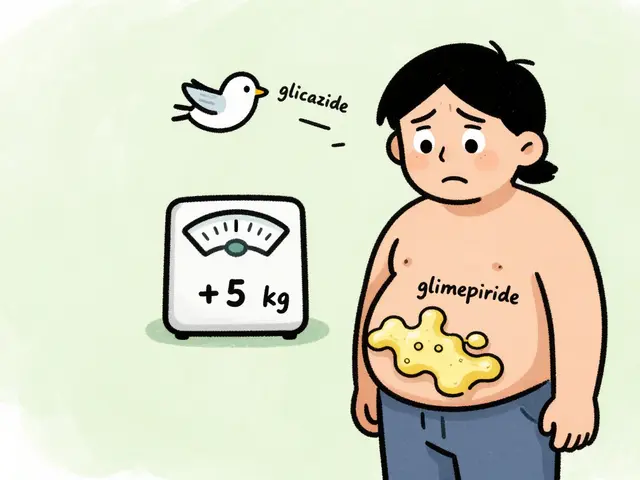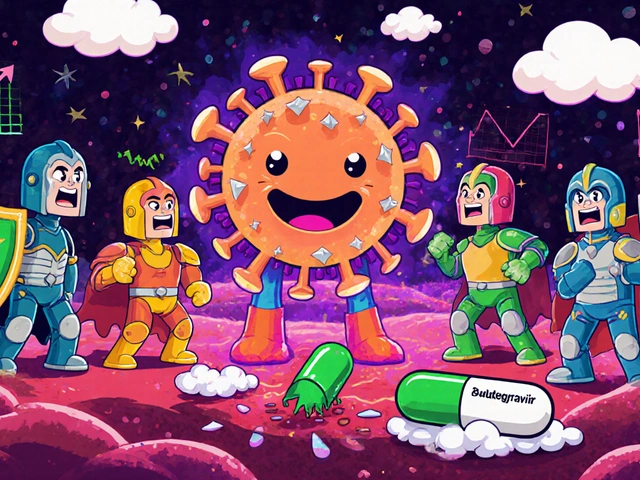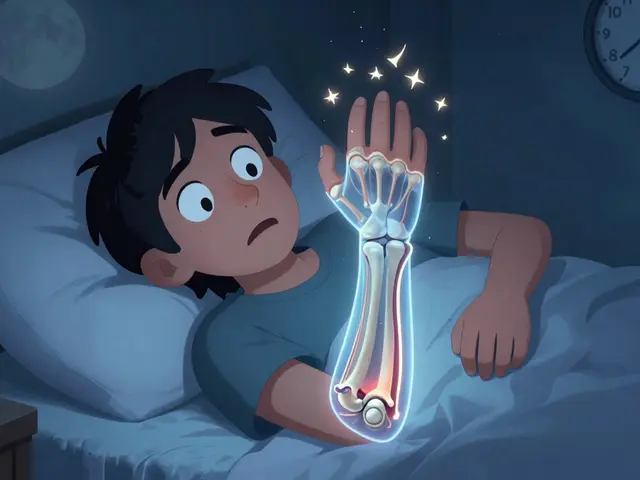Understanding the Role of Calcitriol
If I ventured to say "Calcitriol", what would your reaction be? Most likely a shrug or a puzzled stare, which is not unusual, considering what an under-appreciated compound this is. But, mark my words, without Calcitriol, well, you wouldn't stand a chance! No, I'm not exaggerating, dear reader. Much like my beloved Golden retriever Dexter doesn't stand a chance when his nose catches the scent of bacon frying, we humans can't survive without Calcitriol. You see, Calcitriol, also known as 1,25-Dihydroxyvitamin D3, is the most potent active metabolite of Vitamin D and is essentially responsible for the absorption and regulation of calcium in our body.
Now, you may well ask, “What’s so important about calcium?” Well, let's turn the spotlight on calcium for a moment. It is an essential mineral that makes up about 1.5-2% of an adult human's body weight. That's roughly the weight of Dexter's favourite chew toy! More than 99% of our body's calcium is stored in our bones and teeth where it plays a crucial role in their structure and function. So, keeping the balance of calcium in our body is like making sure Dexter doesn’t try to eat his toy – it's essential for keeping us healthy and robust!
The Magic of Vitamin D and Calcitriol Synthesis
But, back to Calcitriol. This little rascal starts his journey as Vitamin D3, which enters our body via sun exposure or diet. Not to brag, but us lucky folk here in Melbourne get a decent amount of sunshine in summer, so we have endless opportunities to soak up Vitamin D. Once inside, our body gets to work. The Vitamin D3 is converted into 25-hydroxyvitamin D in the liver, and then into its final form, Calcitriol, in the kidneys. This is precisely where the hocus pocus happens, turning an ordinary compound into an indispensable player in our body's calcium game.
It's interesting to note that the synthesis of Calcitriol is a tightly controlled process. It's not a matter of "more is better". In fact, it's just like feeding Dexter. Give him too less, and he’s cranky; but give him too much, and he's sick. So, the body metabolises Vitamin D into Calcitriol only as needed, keeping a close eye on our blood calcium levels to regulate this process.
Calcitriol: the Calcium Conductor
So what does Calcitriol do with calcium? Think of Calcitriol as a conductor, and calcium as the orchestra. When Calcitriol takes to the podium, it waves its baton to the musicians - the intestines, kidneys and bones - instructing them to play the "Symphony of Calcium Absorption". In the intestines, Calcitriol encourages the uptake of dietary calcium, increasing its absorption. In the kidneys, it helps prevent calcium loss, telling them to reabsorb calcium back into the bloodstream rather than let it go waste in the urine. And in the bones, Calcitriol regulates the release of calcium into the blood. Quite the maestro, isn't it?
Without Calcitriol, the body would not be able to properly absorb or regulate calcium. This could lead to lower blood calcium levels, weak bones, and in severe cases, it could result in diseases like rickets in children or osteoporosis in adults. Just as Dexter can’t perform his best without his chew toy, our bodies can’t function at peak performance without a healthy supply of calcium and the conductor, Calcitriol.
Keeping Calcitriol Happy: Diet and Lifestyle
So how do we ensure our body has enough Calcitriol to keep the calcium orchestra playing? Diet and lifestyle play a crucial role here. We can help our body by ensuring adequate sun exposure and having a diet rich in Vitamin D (found in foods like fatty fish, cheese, and egg yolks), and calcium (found in dairy, green leafy veggies and fortified foods).
But remember, balance is key. Too much sun exposure, and we risk skin damage; too little, and we risk Vitamin D deficiency. The same goes for diet – excess calcium can lead to kidney stones, while deficiency can lead to bone diseases. So maintain a balanced diet and lifestyle for optimum Calcitriol synthesis. Just like with Dexter, moderation is key - keep the bacon to occasional treats, and stick to healthy, balanced meals for the most part.
Say Hello to Calcitriol: The Unsung Hero
The more I researched Calcitriol, the more fascinated I became. I guess it’s true what they say – sometimes it’s the unsung heroes in the back, quietly keeping everything running smoothly, that are the real stars of the show. The same goes for Calcitriol – it quietly works behind the scenes, coordinating the intricate dance of calcium absorption and regulation in our body, making sure we stay healthy and strong. Kinda like Dexter, my faithful canine companion, always there to keep me company, to provide comfort or just to make me laugh with his adorable antics.
So the next time you catch some Melbourne sunshine or enjoy a piece of cheese, spare a thought for the unsung hero, Calcitriol. Always there, always essential, and always on the job, ensuring your body's calcium levels are just right, one molecule at a time. Do me a favour, will you? Go out there and spread the word about Calcitriol. Let's give this unsung hero the recognition it deserves!







9 Comments
Calcitriol is the secret sauce that keeps our bones from turning into crumbling cookie crumbs-without it, we’re just a pile of busted bacon dreams.
Wow, what a fascinating dive into the world of vitamin D! Your energy really brings the science to life. Keeping an eye on sun exposure and tasty calcium sources is a smart move. Let’s all spread the word and keep our bodies humming like a well‑tuned band.
Your depiction of calcitriol as a heroic conductor, while vivid, overlooks the intricate feedback mechanisms governed by parathyroid hormone and renal 1α‑hydroxylase activity. The synthesis pathway is subject to tight regulation to prevent hypercalcemia. Moreover, dietary calcium alone cannot compensate for deficiencies in active vitamin D. Clinical management therefore emphasizes both supplementation and monitoring. Your analogy, though engaging, simplifies complex endocrinology.
Exactly, think of calcitriol as the captain of a ship steering us through nutrient seas. When you feed it the right amount of sunshine and food, it keeps the calcium crew disciplined. Too little and the hull weakens; too much and you risk a storm of kidney stones. Stay aggressive in your health habits and you’ll never be adrift. Keep pushing forward.
Your optimism is charming but a bit naive. The reality of vitamin D metabolism is riddled with pitfalls that many overlook. Readers deserve a more balanced view that warns about over‑supplementation.
Let me be clear: the literature is saturated with half‑baked claims about calcitriol. My experience tells me that only a handful of studies truly grasp its biochemical elegance. Most people simply repeat buzzwords without depth. If you want genuine insight, start reading primary research, not blog recaps. Anything less is intellectual laziness.
Reading through your post was like taking a pleasant stroll through a sun‑lit park, each sentence blooming with insight. 🌞 The way you linked Dexter’s bacon enthusiasm to calcium metabolism was both adorable and scientifically sound. By highlighting the dual role of calcitriol in intestinal absorption and renal reabsorption, you illuminated a complex dance that many overlook. The analogy of a conductor leading an orchestra perfectly captures the coordinated effort among gut, bone, and kidney. Your emphasis on moderation in sun exposure respects both dermatological health and vitamin D synthesis, striking a wise balance. I also appreciate the nod to dietary sources like fatty fish, cheese, and leafy greens, reinforcing the idea that nutrition is a team sport. Moreover, the caution against excess calcium leading to kidney stones reminded me of the fine line we walk in supplementation. Your call to spread the word about this unsung hero resonates deeply; it’s a rallying cry for public health advocacy. 😊 In the grand scheme, your piece serves as a bridge between molecular biology and everyday life, making science accessible without dumbing it down. The inclusion of credible references adds scholarly weight, while the friendly tone keeps readers engaged. Overall, this is a masterclass in science communication-thorough, enthusiastic, and beautifully human.
I concur with the detailed explanation provided earlier. The regulatory loops involving parathyroid hormone are essential. Maintaining adequate vitamin D status prevents secondary hyperparathyroidism. Your summary captures these points succinctly.
Great insights all around! If anyone is looking for practical steps, consider a short daily walk outside when the UV index is moderate, combined with a serving of salmon or fortified milk. Regular check‑ups can monitor serum calcium and vitamin D levels to avoid hidden deficiencies. Also, remember that bone health benefits from weight‑bearing exercise alongside proper nutrition. Keep sharing knowledge, and let’s keep our communities healthy.